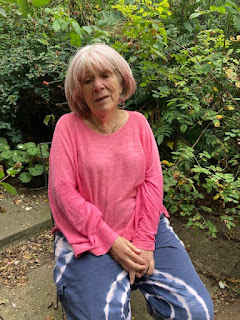Living with Shadows by Merilyn Moos
I am delighted that Socialist History Journal are publishing my review of this book
On the cover of this book is a photo of Ossip Zadkine’s statue in Rotterdam called The Destroyed City. Merilyn’s parents took her to see it as a ten-year-old child. She was never quite sure why they had crossed a stormy sea and walked through a rainy city to reach it, but it showed “screaming defiance against those who had torn out its heart”. To her, it also appeared to be holding up an invisible world. These are two determining factors in the author’s own life: defiance and the struggle to build a better world.
Merilyn Moos has spent her life haunted by shadows. “Not,” she writes, “B-movie ghosts in gothic hallways, but something emanating a sense of death.”
A distant relative of Albert Einstein and daughter of German refugees, she was born into a home of secrecy and paranoia. Her parents had lived under Nazism and Stalinism. Her father, Siegi, was a member of the Red Front and was a leading figure in anti-fascist agit-prop. He witnessed sailors declaring a Soviet on the steps of Munich Town Hall in 1918. After the Reichstag fire, he escaped the Gestapo by walking across Germany.
Her mother, Lotte, followed her Irish communist lover to the USSR and felt guilty that she may have contributed to his death. He was sent to Spain at the time of the Civil War there. In a postcard she wrote to him, she praised the leftist, anti-Stalinist POUM. He was kidnapped, sent back for ‘trial’ in the Soviet Union, accused of Trotskyism and died in the gulags. She never stopped mourning him, or blaming herself, for what she had innocently written.
Her parents arrived separately in the UK where, in 1940, Lotte was incarcerated in Holloway Prison as a German spy.
Merilyn’s parents were burdened with regret and guilt. Her mother shut her bedroom door and found refuge in writing plays and poems, while her father expressed himself with painting.
This short memoir is a penetrating and personal reflection on her early life in Durham. She communicates to the reader how much of our lives are determined by the cultural and political shadows we inhabit and absorb.
“For my father culture and politics were inseparable . . . our house was a bit like an expressionist museum. On one wall was a relief bust of the revolutionary, Alexandra Kollontai . . . over other walls hung my father’s paintings. Dark and dramatic . . . they were clarion calls against injustice and inequality.”
Of her mother she writes, “If annoyed my mother would not speak to me for days, sometimes weeks . . . she did this without telling me what she was upset about. I was terrified . . . I felt unreal and without any right to exist . . . I learned not to speak to her. Sometimes, as the three of us sat eating a meal, she said to my father, ‘Tell Merilyn,’ and then he would.”
Merilyn found her own comfort in books and, as an adult, in her sculptures and her own political activism. She thought she was rebelling against her parents’ politics, only to discover how similar hers were to theirs. She acknowledges that she has spent her life carrying the baton passed to her by her parents.
After many years as a trade union militant in further education, Merilyn started to write about her family history. She first wrote about her parents in an earlier book, The Language of Silence, but in recent years, she has dealt with the history of anti-Nazism within the German working class to help counter the view there was no significant German resistance.
This book has photos of Siegi’s paintings and Merilyn’s sculptures.
I have known Merilyn for fifty years and have solidarity for her politics, activism and determination to face painful truths.
David Wilson
David Wilson, author of Left Field and co-founder of War Child

